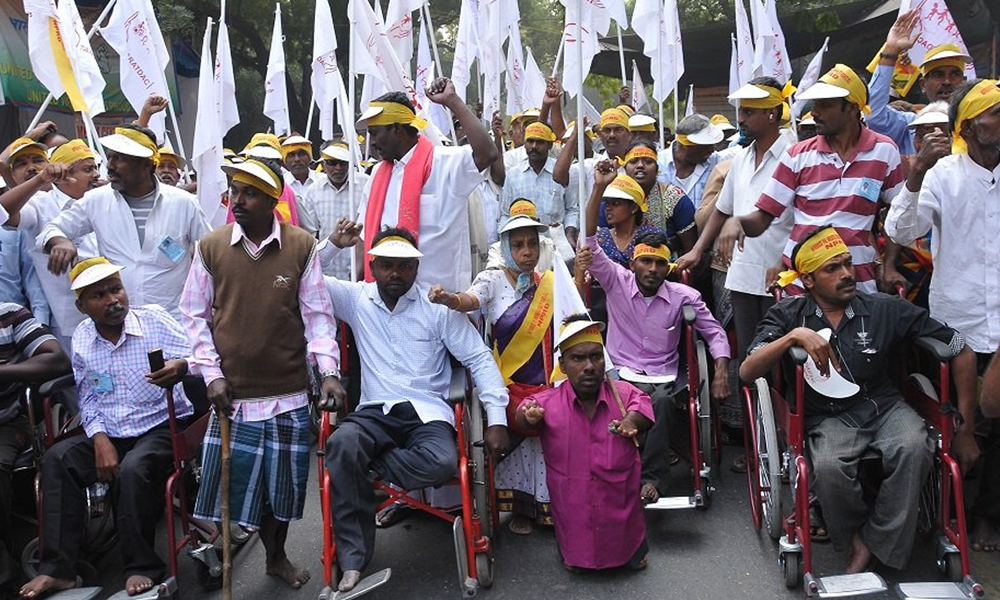
Centre Proposes Decriminalisation Of Minor Offences Under Disabilities Act 2016, Activists Protest
Writer: Devyani Madaik
A media enthusiast, Devyani believes in learning on the job and there is nothing off limits when it comes to work. Writing is her passion and she is always ready for a debate as well.
India, 6 July 2020 12:20 PM GMT | Updated 6 July 2020 12:59 PM GMT
Editor : Shubhendu Deshmukh |
Shubhendu, the quint essential news junky, the man who loves science and politics in equal measure and offers the complete contrast to it by being a fan of urdu poetry as well.
Creatives : Abhishek M
" An engineer by profession, Abhishek is the creative producer of the team, graphic designing is his passion and travelling his get away. In more ways than one, he makes the content visually appealing."
Several organisations have opposed the proposal and said that the Act protected specially-abled persons against any incident that put their self-esteem under attack and helped restore their dignity.
The Ministry of Social Justice and Empowerment's notification proposing the decriminalization of minor offences under the Rights of Persons with Disabilities (RPwD) Act, 2016 has drawn massive flak from the specially-abled persons, activists, and organizations.
The letter was issued by the Ministry to a few non-governmental organisations on Wednesday titled as 'Decriminalization of Minor Offences For Improving Business Sentiment And Unclogging Court Processes – Amendment in RPwD Act, 2016.
It stated that 'decriminalisation of minor offences are expected to go a long way in improving ease of doing business and helping unclog the court system and prisons'.
The rationale to dilute the clause is 'in view to ensure implementation of the 2016 RPwD Act, as well as providing a mechanism for the speedy discharge of cases for the minor violation without involving serious offence', it added.
The proposal has now been put out in the official website for stakeholders and citizens to submit their suggestions until July 10.
Several organisations have opposed the proposal and said that the Act protected specially-abled persons against any incident that put their self-esteem under attack and helped restore their dignity, especially who had been denied equal opportunities in employment and education.
The activists said that this will nullify the 'little achievements' gained over the years and negatively impact people with disabilities.
The Social Justice Ministry has justified that some cases can be compounded or settled outside court. It further said that imprisonment in cases that are not the outcome of 'mala fide intention' acts as a hurdle in attracting investments- both domestic and foreign.
"The ensuing uncertainty in legal processes and the time taken for resolution in the courts hurt ease of doing business. Criminal penalties including imprisonment for minor offences act as deterrents, and this is perceived as one of the major reasons impacting business sentiment and hindering investments both from domestic and foreign investors," the letter read.
It added that legitimizing the dilution of the clause becomes even more pertinent in the post COVID19 time, as it can help revive economic growth and improve the justice system in India. Three sections in the act that are under review include Sections 89, 92, 93.
Under Sec 89, an accused is imposed with ₹10,000 fine, those who contravene the act once, and ₹50,000 or ₹5,00,000 for repeated contraventions). Under Sec 92, anyone who humiliates specially-abled persons in public view can be put behind bars for six months to over five years, along with a fine. Under Sec 93, a fine of ₹25,000 is imposed against someone who refuses to furnish legally mandated information.
The current proposal intends to nullify Section 92, the only one that has a provision for imprisonment, and negotiation of penalties that are imposed in Sec 89 and 93 under supervision of either the Chief Commissioner for Persons with Disabilities or State Commissioners for Persons with Disabilities.
Nipun Malhotra, a disability activist in his article for Scroll said that the message with this amendment, unfortunately, is clear: the courts are too busy and they don't have time for the disabled'.
Also Read: India-China Standoff: Chinese Army Pulls Back From Galwan Valley
 All section
All section














